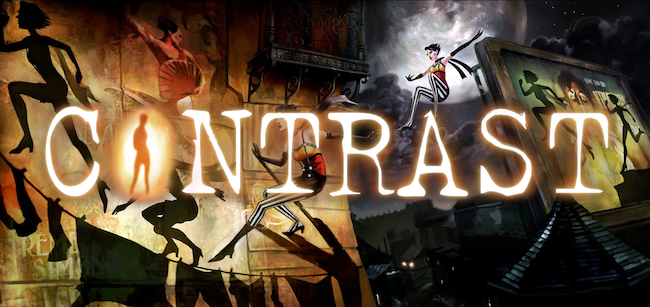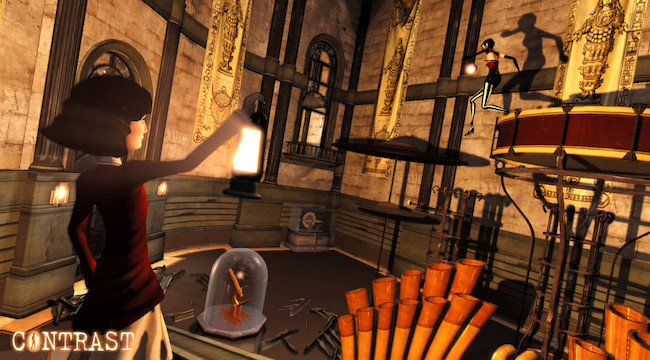
Contrast is an obtuse re-imagining of 1920s Paris, and a world where shadows play an important role. In the game, players will take on the role of Dawn; the ‘imaginary’ friend of a young girl named Didi. However, as a part of her questionable existence, the only person visible to her is the young girl. As such, the “real world” is only perceivable to the player through various shadows on the walls, but what’s interesting about this concept is that Dawn has the ability to transform into a shadow herself, thus, traversing other shadows to overcome obstacles. This provides an interesting opportunity for puzzle-platforming, as well as the exploration of this bizarre world.
Didi’s parents have been having troubles, and while she lives with her showgirl mother, she wishes her father would come home. As a figment of Didi’s imagination, repairing their relationship is in your best interest too. If Didi can help her father impress her mother, they’ll surely get back together, and she’d get to see her Dad again. For a simple, naive premise, it flirts with some darker, more emotional topics, and at times seems as if it’s taking a turn towards something deeper and more meaningful. However, for each of these serious turns, Contrast returns to its childish tone. It would have been fantastic to have seen the mature, harder hitting aspects of the plot given more prevalence, but Contrast still provides a reasonable, fully realised narrative within a relatively short game.

When shadows are important, light becomes equally as important, and as such, moving around light sources and objects relative to each other in order to create the necessary shadows is pivotal in Contrast. Positioning a box close to a light could make a shadow on the wall to be used as a step to a higher ledge, or positioning a light pointing at someone could mean their shadow can be used as a platform to cross a gap. It’s a clever concept that provides clever puzzles. Comparable to the mechanics of a game like Portal, it’s instantly clear that these simple puzzles could evolve to intricate, intelligent tests of brainpower. Unfortunately, though, they never really become anything unexpected. They take steps forward, introducing the idea of turning objects into shadows and back, and essentially carrying shadow objects across surfaces with lights, but this is as far as the puzzles develop.
The progression of the puzzles you’re faced with is fairly abrupt and can be frustrating. I found myself getting stuck on puzzles that weren’t necessarily difficult to figure out because objects or parts of the environment that were needed to solve them weren’t made obvious. Since objects that can be interacted with aren’t introduced until they’re needed in more complex situations, it’s easy to not even realise they can be used or play any part in the solution. So even though none of the puzzles are overly complex, the amount of experimentation expected of the player can create frustration. When coupled with a set of rough controls, this can become pretty annoying.

Dawn moves quickly and sharply, which stylistically fits the tone well, but can be a draw back from the quality of the gameplay. As such, the platforming can sometimes feel inaccurate, and stepping out of place as a shadow can abruptly push you out of the surface and back into the three dimensional world. It doesn’t ruin the game by any means, but any added amount of smoothness and accuracy to the controls would have made the game much more fun to play. Moving around while holding objects also feels jarringly slow compared to the standard swiftness of Dawn’s movements, and additionally, having to see a cutscene each time you touch a button showing what it does is particularly annoying. The gameplay and controls certainly don’t feel broken, just a bit unpolished.
On a positive note, Contrast presents an interesting visual design. Essentially melding a hybrid of hand-drawn aesthetics with a more realistic style to create a Tim Burton-esque world full of a dark charm and style. Graphically, there’s nothing particularly impressive about Contrast, if anything I found it lacking in this area, but it doesn’t really matter in a game with this kind of artistic approach. Each character is visually interesting, even though the majority of them are only seen as silhouettes. It’s also worth noting the creative design of the environments which are artfully constructed right down to the puddles in the streets. From the hand drawn posters on the walls, through to the strange chasm’s throughout the city, it all looks and feels the part quite nicely.
 Clever gameplay concepts
Clever gameplay concepts Inspired, artistic presentation
Inspired, artistic presentation Interesting narrative premise
Interesting narrative premise
 Controls feel inaccurate
Controls feel inaccurate Puzzles never achieve potential
Puzzles never achieve potential Some mechanics feel ill-explained
Some mechanics feel ill-explained Experimentation can grow tedious
Experimentation can grow tedious
Contrast is a game based on a simple mechanic that could have created all kinds of wonderful puzzles, but failed to expand on the concept in any interesting sense. The puzzles that are provided can be frustratingly unexplained, but the narrative and presentation should be enough to keep the experience intriguing from start to finish. Contrast is a short but fun experience that anyone interested in puzzle-platforming is sure to enjoy, even if just for the novelty of turning into a shadow. Beyond this, I couldn’t recommend solely on the merit of its quality.











